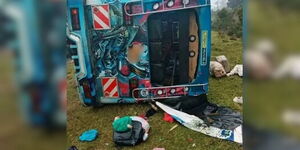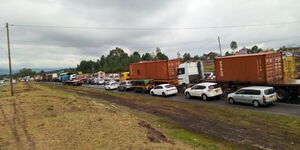The Independent Policing Oversight Authority (IPOA) has raised serious concerns about the lack of cooperation from police commanders and other government agencies in ongoing investigations.
IPOA Commissioner John Waiganjo has accused senior police officers of creating a hostile environment and failing to respond to summonses, hindering the authority's efforts to carry out its mandate.
"We do not work on our own," Commissioner Waiganjo emphasized.
Waiganjo disclosed that some investigations have hit a snag after their officers failed to be granted access to critical information to build up a report.
"Once we carry out our investigations, other agencies will necessarily take over. However, we have found a very hostile environment where our officers do not get any information when they go out there. When we give out a summons, they are not responded to,” the IPOA commissioner complained.
He explained that the authority had resorted to extreme measures to ensure they did their job in tracking down rogue officers who meted unwarranted brutality to relatively peaceful protesters.
“We are now pushing the matter to the Judiciary to issue warrants of arrest against senior commanders so that they can come and give us information because the public is demanding that we do certain things within our mandate," he said.
Waiganjo highlighted the severity of the issue, noting that most deaths under investigation have occurred in Nairobi, with the number exceeding 22.
The IPOA is seeking deployment schedules and arms registers to determine the whereabouts of firearms and their handlers.
Without cooperation from senior police officers, the commissioner stated that the authority’s work appears ineffective. Non-cooperation extends beyond the police force.
Waiganjo pointed out that other government institutions, including health facilities like Kenyatta National Hospital (KNH), have been uncooperative.
The IPOA has been unable to obtain necessary medical records related to gunshot wounds sustained during recent demonstrations.
"It is a tough assignment indeed, but we are making some progress," Waiganjo said.
He acknowledged the challenges faced in tracking down individuals who have been abducted, noting that many who were publicly reported as abducted have since been released without charges.
However, for those whose abductions were not recorded, their whereabouts remain unknown.
Commissioner Waiganjo stressed the importance of public awareness regarding the constraints under which the IPOA operates.
"We want the public to know the circumstances under which we are working because we have received a lot of flack, particularly from the public online. It is important to put the information out there that the authority can only do as much because we have a mandate, and the mandate is in law and it is restricted," he said.
The IPOA's mandate is to oversee the conduct of the police force, ensuring accountability and transparency.
However, the lack of cooperation from key institutions poses a significant challenge to fulfilling this role.
The authority’s move to seek judicial intervention is a critical step in addressing these obstacles and ensuring that justice is served.












